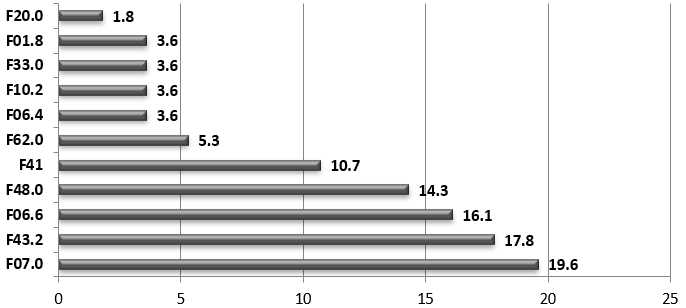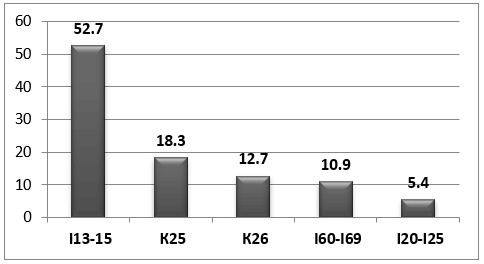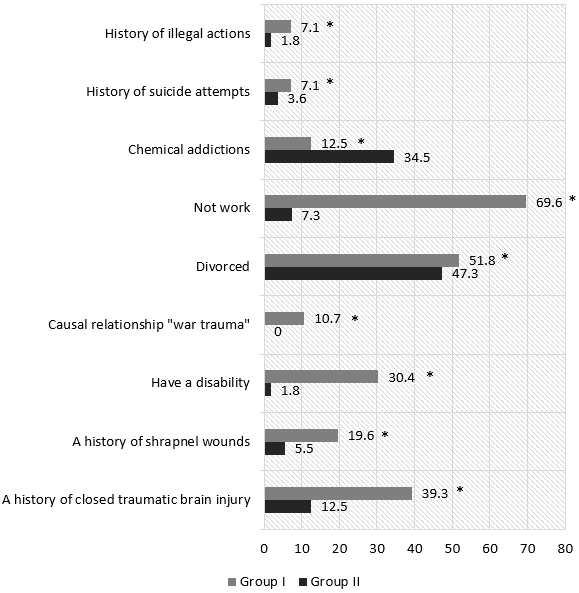Mental Health of Retired Ex-Combatants
A B S T R A C T
Purpose: The purpose of the study is to analyze the structure of mental disorders and social adaptation in retired ex-combatants of the security forces.
Methods: 111 retired men, ex-combatants who sought medical care, were examined. There are two groups: I: 56 people with identified mental disorders; II: 55 with pre-nosological mental health disorders.
Results: It is shown that the state of mental health of retired ex-combatants is characterized by severe polymorphic mental disorders, especially those expressed in group I (organic, behavioural disorders, substance use, schizophrenia, schizotypic and delusional disorders, affective, neurotic, stress-related, and somatoform disorders, personality and behaviour disorders in adulthood), as well as social maladaptation, associated with the transformation of values, lifestyle and communication, the emergence of difficulties in social and everyday life, the breakdown of social ties and the displacement of pensioners from public life.
Conclusion: The article substantiates the need for a comprehensive approach to the rehabilitation of retired ex-combatants with the interaction of all government structures, public associations, medical, psychological and social institutions directly related to the development and implementation of individual rehabilitation routes.
Keywords
Retired ex-combatants, mental health disorders, social maladaptation, comprehensive assistance, rehabilitation
Introduction
Priority national tasks of demographic policy in the field of health are to strengthen the health of the elderly, strengthen the prevention of morbidity and disability, develop rehabilitation, and introduce modern highly effective health-saving technologies [1]. Particular attention is drawn to the problems of retired law enforcement officers, especially participants in combat operations (combatants) who returned from business trips to perform official tasks in special conditions, without the analysis of which it is impossible to solve demographic and medical and social problems of certain categories of citizens [2, 3]. Mental health protection and social adaptation of combatants also require the development of state measures to reduce the impact of stressors of service activities, complex poly-professional therapy, rehabilitation, and re-socialization with their integration into civil society [4]. However, psychosocial rehabilitation programs often cover only a small number of combatants and are applied in a relatively short time after combat stress; at the same time, in many patients, despite treatment, social isolation worsens, low employment, low level of social functioning and quality of life remain [5, 6]. The purpose of the study is to analyze the structure of mental disorders and social adaptation in retired ex-combatants of the security forces.
Materials and Methods
A comprehensive analysis of the mental health status of 111 retired male ex-combatants of the security forces who sought medical care in a departmental clinic in the period from February to November 2018 was conducted. All respondents were divided into two groups: I) 56 people with identified mental disorders (average age 59.3+1.3 years); II) 55 people with pre-nosological mental health disorders (average age 59.9+1.1 years). A clinical examination was performed when seeking psychiatric help. Diagnosis of mental disorders was carried out in accordance with the criteria of ICD-10, analysis of medical documentation (outpatient records, medical history) was carried out.
Statistical processing of the research results was carried out using the SPSS 22.0 program. The search for relationships between the two qualitative data was performed using the Pierson λ2-criterion, the level of statistical significance р≤0,001.
Results
Nosological structure of mental disorders in the surveyed pensioners - ex-combatants of Group I on retirement for seniority were polymorphic and represented by: organic, including symptomatic mental disorders (F00-F09), mental disorders and behavioural disorders related to substance use (F10-F19), schizophrenia, schizotypal and delusional disorders (F20-F29), affective disorders (F30-F39), neurotic, stress-related, and somatoform disorders (F40-F48), personality and behaviour disorders in adulthood (F60-f69) (Figure 1).
Figure 1: Nosological structure and frequency of occurrence of mental disorders in ex-combatants of Group I, %.
Among retired ex-combatants of Group II, somatic diseases prevailed, represented by two clinical groups: diseases characterized by high blood pressure (I10-I15), diseases of the esophagus, stomach, duodenum (K20-K31) (Figure 2) and a lower incidence of cerebrovascular diseases and coronary heart disease (I60-69 and I20-25) with concomitant neurotic syndromes: asthenic-35.9%, neurotic-24.9%, hypochondriacal-12.1% and various sleep disorders-27.1 %.
Figure 2: Nosological structure and frequency of disorders in ex-combatants of Group II, %.
In the anamnesis, ex-combatants of Group I were significantly more likely to have closed traumatic brain injuries (TBI), shrapnel wounds of various localization, there were significantly more disabled people, including those who were retired due to military trauma, they were more likely to not work, commit suicide attempts and anti-social illegal actions compared to representatives of Group II. Among retired Group II ex-combatants, 47.3 % were divorced; within three years after the dismissal, there was a harmful use of alcohol in 10.4% (which was explained by the need to relieve tension, nervousness, insomnia, inability to relax), as well as the use of sedative medications, 1.8% of respondents were disabled by somatic illness, which, in general, indicates the presence of psychosocial problems (Figure 3).
Figure 3: Social indicators of retired ex-combatants, %.
Confidence (p) was calculated using the Pierson λ2-criterion, the level of statistical significance p < 0.001.
Data from our study showed that when retired ex-combatants were dismissed, the reasons for dismissal were often disciplinary violations, driving while intoxicated, or failure to perform official duties. Often, they were hot-tempered, conflicted with colleagues and commanders, committed illegal actions (hooliganism under the influence of alcohol, intentional infliction of bodily harm, car accidents caused by an employee).
The problem of social adaptation of retired combatants is caused by difficulties in adapting to the new status and new living conditions. The changing social status of pensioners was primarily due to the cessation or limitation of work, transformation of values, lifestyles and communication, difficulties in social life, leading to the rupture of many social relations and the exclusion of pensioners from public life, i.e. social exclusion. Social adaptation of ex-combatants is also complicated by factors such as their lack of competitiveness in the labor market in the changing conditions of modern life, combatant personality traits formed during the service and internal psychological barriers.
In connection with the above, it is necessary to provide comprehensive assistance to retired ex-combatants. A team-based, multi-professional, biopsychosocial approach to providing psychiatric and psychological assistance to retired ex-combatants will improve the quality of its provision and monitor the state of mental health, it is a promising approach that contributes to the destigmatization of psychiatric care in departmental general health institutions. Promotion of integration should be provided with a system of comprehensive medical and social protection measures that provide reserves for improving the health of combatants, aimed at creating conditions for their self-realization, participation in public life and in the development of society [7].
Conclusion
The mental health of retired ex-combatants of the security forces is characterized by pronounced polymorphic mental disorders - clinically expressed and pre-nosological disorders and social maladaptation. This requires the development of a comprehensive approach to the implementation of therapy and rehabilitation programs for this population with the interaction of all government structures, public associations, medical, psychological and social institutions directly related to the development and implementation of Individual rehabilitation routes.
Conflicts of Interest
None.
Funding
Contents are solely the responsibility of the authors and do not necessarily represent official views of any funding agency.
Article Info
Article Type
Research ArticlePublication history
Received: Mon 25, May 2020Accepted: Sat 20, Jun 2020
Published: Mon 29, Jun 2020
Copyright
© 2023 Andrey Soloviev. This is an open-access article distributed under the terms of the Creative Commons Attribution License, which permits unrestricted use, distribution, and reproduction in any medium, provided the original author and source are credited. Hosting by Science Repository.DOI: 10.31487/j.GGR.2020.02.02
Author Info
Elena Ichitovkina Andrey Soloviev
Corresponding Author
Andrey SolovievNorthern State Medical University, Arkhangelsk, Russia
Figures & Tables



Confidence (p) was calculated using the Pierson λ2-criterion, the level of statistical significance p < 0.001.
References
- Ichitovkina EG, Zlokazova MV, Soloviev AG (2017) System monitoring of mental health of combatants-police officers. Arkhangelsk: Publishing House of the Northern State Medical University 205.
- Zhovnerchuk EV, Zhovnerchuk IY, Bogdasarov YuV, Dvinskikh MV (2018) Medical and psychological rehabilitation of employees of internal affairs bodies (current state of the problem). Labor Medicine and Industrial Ecology 2: 6-10.
- Shamrey VK, Lytkin VM, Driga BV, Kolov SA (2011) Clinical and diagnostic aspects of post-traumatic combat stress disorders. Voen med Zh 332: 28-35. [Crossref]
- Gorina AA (2017) Rehabilitation of employees who took part in the fighting, as a necessary component of a full life. Step into Science 4: 27-29.
- Soloviev AG, Shutova AA, Zlokazova MV, Ichitovkina EG (2017) Dynamics of formation of mental disorders in retired combatants of the Ministry of internal Affairs. Adv gerontol 30: 912-916. [Crossref]
- Cherniy YV (2004) Health state of the Ministry of Internal Affairs pensioners and the improvement of their sanatorium-rehabilitation treatment: Abstract of MD Thesis. St. Petersburg, Russia.
- Soloviev AG, Ichitovkina EG, Zlokazova MV (2016) Analysis of the catamnesis of retired combatants of the Ministry of Internal Affairs with mental disorders. Adv gerontol 29: 836-838. [Crossref]
